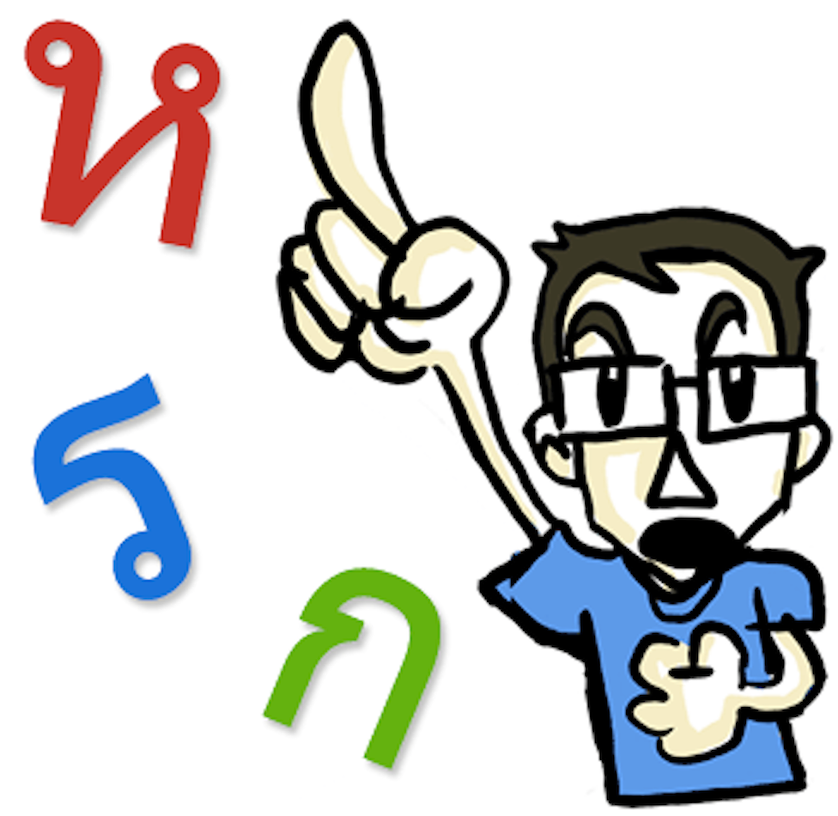Ever struggle at learning Thai? I did at the start. I was plagued by all those monotonous teachers and that unhelpful (and downright confusing) phonetic language that we all should somehow just know because it looks a bit like English (it’s not anything like English by the way). But I was lucky, I went back to the UK and studied a degree in Thai language to really get me going…but that’s not the point of this story.
This story is about a man named Brett Whiteside, who, after coming to Thailand over fourteen years ago, managed to teach himself Thai, and more specifically, the Thai alphabet in no time at all. Now, at the age of 37, Whiteside makes a comfortable living off teaching other foreigners Thai via his online teaching programs. He also has two books out; one called Read Thai in 2 Weeks – based on his online course, and Talking Thai, a Chiang Mai focused colloquial conversation handbook for more advanced readers. But what makes this ‘White’ guy teaching Thai so much better than a native speaker? Well let’s take Whiteside as a case study and see…
When Whiteside came to Thailand he knew nothing, not what language was spoken (easy guess mind), what currency they used or even that Chiang Mai was a city in the north. Yet despite the unknown, he sold his possessions, left everything behind and moved to Thailand at just 23 years old.
“When I left the US, I didn’t even know what Thailand was,” he explained to me sipping on a coffee in on of Chiang Mai’s more popular digital nomad cafés. “But as soon as I arrived, I knew I would stay.” He soon began teaching himself what he could from Thai phrase books and made an effort to be friends with Thais rather than foreigners. “When I set foot in Chiang Mai, after just two weeks in the country, I knew this was a great place to settle,” he said. “Back then there were no hipsters, no coffee shops and no salad shops…Thai people don’t eat salad, it’s just a thing they’re going through.”
Within his first year he decided to enrol at Payap University, with a desire to study as many languages as he could. Unfortunately these dreams quickly faded when he was told all languages were taught at the same time so he couldn’t learn more than one anyway – so he stuck with his Thai, which was probably wise given the country he was in.
He hit the ground running and soon thought that he had quite a grasp on Thai. However, soon into his study, he was greeted by harsh reality. “Then I went to other provinces,” he said. “I would talk and nobody would understand me. I thought to myself, ‘what’s wrong with them?’ but that quickly became ‘what’s wrong with me?’.”
He soon realised that Payap alone couldn’t help him become fluent – he knew it was his tones that failed him. “To learn tones, one needs to learn the alphabet.” And indeed, learning the alphabet was his next move, and this by far was the best move he could have made.
I can vouch for this entirely. To learn Thai, is to learn tones; and to learn tones, is to learn the alphabet. Whiteside compared learning tones to learning Trig. “There is three beginnings and many endings depending on what you add to your equation, if you want to learn Thai, you should learn Trig first,” he laughed.
After three to four years, friends of Whiteside were talking about how it was so hard to learn, and soon he was convinced to try teaching one of his mates. Start with the alphabet then all the rest fits into place. Within a month or two, his friend could read almost anything in Thai, and his skills sky rocketed.
From then on, Whiteside took on teaching Thai in his spare time to help pay his way through university. Before long he had a large number of happy students and seeing the dawn of the online blogger, he saw the opportunity and began blogging his experience.
Payap soon noticed his skills and during his last year of study, the university even hired him to teach Thai to US exchange students. “The difference was that everyone I had taught before were already practiced in speaking Thai,” he said. “But these US exchange students were total beginners – I had to make a system that could work for them.”
This system that he developed in 2008 is still the basis of his system that is so popular today. Now his website (www.learnthaifromawhiteguy.com) promises every customer to read Thai in 10 hours, but often people achieve it in five.
“I have many people come and say to me that it’s impossible, there is no way to learn Thai in such a short time,” White laughs. “Truth is, if you stretch out your study, you will fail.” Crunching the work and spending a short focused period, dedicated to learning is his proven method towards success.

Inspired by this, Whiteside began developing an app that only last year, won first prize in the Chiang Mai Global Start-up Weekend.
“Read What I Want (www.readwhatiwant.co) is way beyond just language learning,” he explained. “It’s an app focused on helping non-native speakers skim text just like a native can.” It does this by using frequency algorithms and community based input to highlight key words in a block of text. The concept is that the app enables you read the key words – most of which you will know – and purposefully helps you ignore irrelevant words, depending on your skill levels. Although the app is not finished, any developers who are interested can get in touch to join his team and help make it a reality.
The story of Brett Whiteside, is not only impressive, but a great case study for that friend of yours who’s lived here for years but still can’t order a coffee. I myself am a non-native Thai speaker, who began studying in a similar way to Whiteside’s humble beginnings – alphabet first. I even covered my bedroom wall in the Thai letters a whole year before I came here at the age of 18.
The truth is, and don’t take this as a dig…but I agree with Whiteside when he says that anyone can learn Thai. Whether you self-teach, study in a university or use an online course such as this one, there is always a way. We all can become complacent and less motivated as time goes by, but, according to Whiteside, if we all took just 10 hours of our life to really knuckle down, it can make all the difference.
